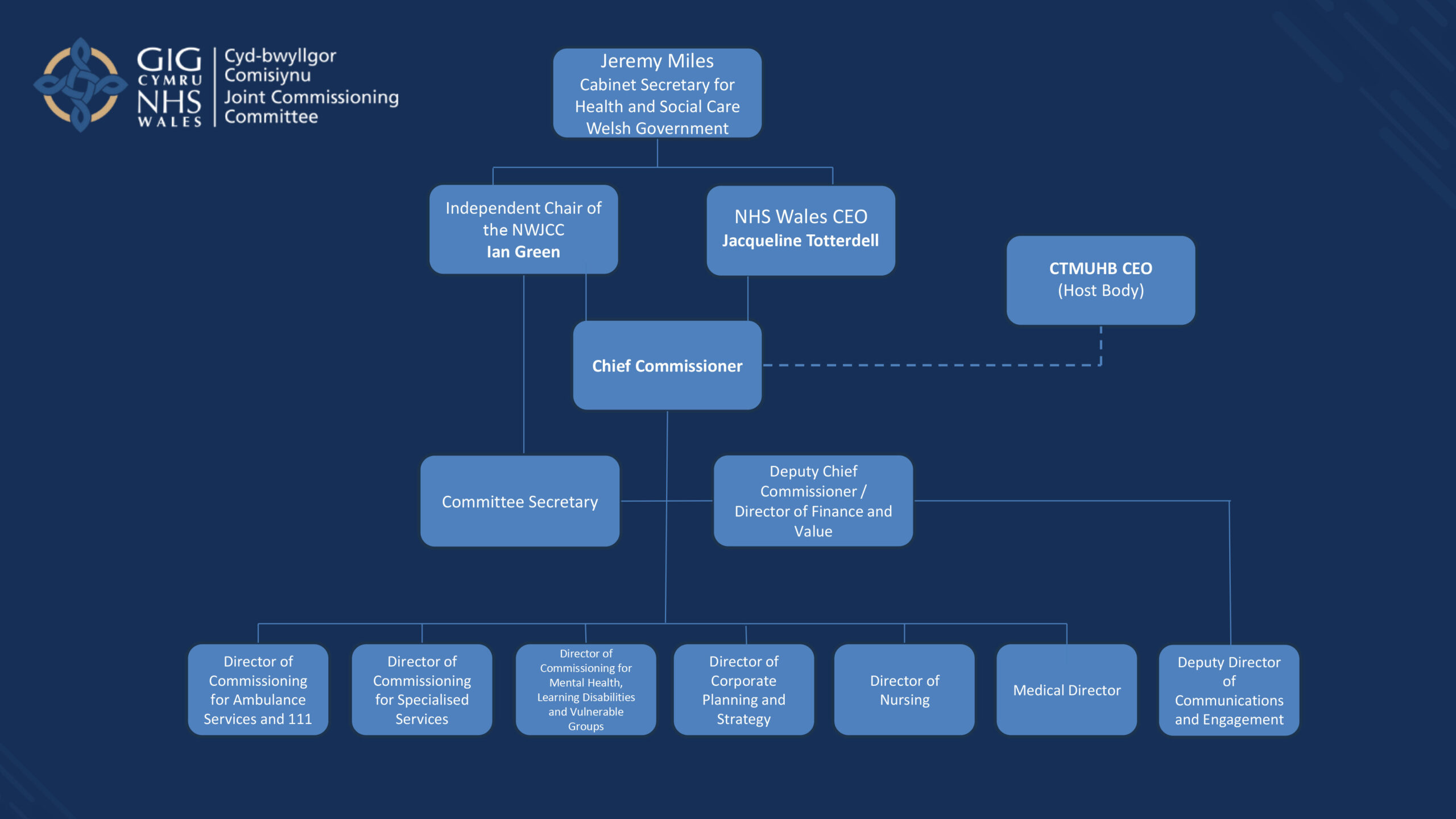NHS Wales Joint Commissioning Committee (JCC)
About us
The NHS Wales Joint Commissioning Committee (JCC) is a Joint Committee of the seven Health Boards in Wales acting collectively on their behalf.
The JCC was established in response to the findings of an independent review commissioned by Welsh Government into the national commissioning arrangements in Wales. These were formerly undertaken by the Emergency Ambulance Services Committee (EASC), the Welsh Health Specialised Services Committee (WHSSC) and the National Collaborative Commissioning Unit (NCCU).
From 1 April 2024, the JCC replaced EASC and WHSSC and assumed responsibility for the services previously commissioned by these committees and the NCCU, together with the commissioning of NHS 111 Wales services, and the Wales Sexual Assault Referral Centres.
Individual Health Boards are ultimately accountable to their population and other stakeholders for the provision of the services commissioned by the JCC for the residents in their area. We are hosted by Cwm Taf Morgannwg University Health Board.
The Committee
The NHS Wales Joint Commissioning Committee is a Joint Committee of the seven Health Boards. It consists of an independent Chair, five Lay Members, the seven Chief Executives of the Health Boards and the Chief Commissioner is an Associate Member.
The Joint Committee has been established for the purpose of jointly exercising those functions relating to the planning, securing and commissioning of:
- specialised services for:
– cancer and blood disorders
– cardiac conditions
– mental health and vulnerable groups
– neurosciences, and
– women and children.
- services where there is agreement between the Local Health Boards that they should be arranged on a regional or national basis
- emergency medical services
- non-emergency patient transport services
- emergency medical retrieval and transfer services
- NHS 111 services
- sexual assault referral centres, and
- other services as directed by the Welsh Ministers.
Our Role
The Joint Committee’s role is to:
- Determine a long-term strategy for the commissioning of services delegated to the JCC
- Produce an Integrated Medium-Term Plan which describes how these services will be delivered on behalf of Health Boards through clear ‘commissioning intentions’ which informs and compliments the Health Boards Integrated Medium-Term Plans (IMTPs)
- In commissioning services, the JCC will act in accordance with the Directions and Scheme of Delegation of the health boards and will, for the relevant functions:
- Identify and evaluate existing, new and emerging services and treatments and advise on the way in which these services should be delivered
- Develop policies for the equitable access to safe and sustainable, high quality health care services across Wales for those services which fall within the scope of the JCC
- Determine annually those services that should be commissioned on a regional or national basis
- Determine the appropriate level of funding for the commissioning of directed and delegated services at a regional or national level and determine the contribution from each Health Boards for those services (which will include the running costs of the JCC and the Joint Commissioning Team) in accordance with any specific directions set by the Welsh Ministers
- Secure the provision of services delegated at a regional and national level including those to be delivered by providers outside of Wales
- Ensure the JCC operates within an appropriate governance framework.
How the Committee has been legally created:
In Wales, Welsh statutory instruments are the most common form of subordinate legislation and usually take the form of regulations or orders. The majority of Welsh subordinate legislation is laid before the Senedd. The Directions and Regulations have been made through the exercise of powers in the National Health Service (Wales) Act 2006.
Subordinate legislation can only be made if primary legislation confers a power to do so. The primary legislation is known as the enabling act, because it enables the subordinate legislation to be made. In Wales, the Welsh Ministers make subordinate legislation using powers given to them in enabling acts such as Senedd Acts, Assembly Measures and Acts of the UK Parliament. Subordinate legislation is also often referred to as delegated legislation, because the power to make subordinate legislation is delegated by the enabling act. Subordinate legislation is also referred to as secondary legislation.
Welsh Subordinate Legislation Directions are legally binding and must be followed by those affected by the subordinate legislation to which they relate. They play a crucial role in ensuring consistency, clarity, and effective implementation of laws and regulations in Wales.
The National Health Service Joint Commissioning Committee (Wales) Directions 2024
The Welsh Ministers provided the Directions in exercise of their powers related to the NHS (Wales) Act 2006 to each local health board in that they must jointly exercise the relevant functions from 1 April 2024. The Directors provide the detail of the functions for the planning, securing and commissioning by the JCC. The Directions include the membership of the JCC and also clarify the revocations of other Directions for the former joint committees.
The National Health Service Joint Commissioning Committee (Wales) Regulations 2024
These Regulations make provision for the constitution and membership of the NHS Wales Joint Commissioning Committee (“the joint committee”) including its procedures and administrative arrangements. The National Health Service Joint Commissioning Committee (Wales) Directions 2024, which were made on 6 February 2024, provide that the Local Health Boards in Wales will work jointly to exercise functions relating to the planning and securing of certain services. For the purpose of jointly exercising those functions, The NHS Wales Joint Commissioning Committee (JCC) was formally established and became operational on April 1, 2024.


